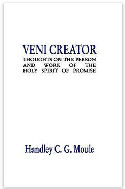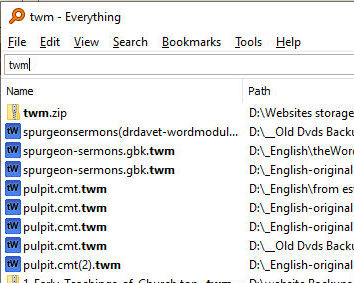Evaluating Different Bibles by Literalness
Evaluating Different Bibles by Literalness
By David Cox
This post is to help us get a focus on the difference between Bible versions. To get a focus on the subject of Bibles, we need to understand that there are different translation theories used in translating the Bible (or any literary work) from one language to another.

Moule Veni Creati is an old, well known work in studies in the Holy Spirit by Bishop (Anglican) H.G.C. Moule. It has 12 chapters. It is a deep treatment of the Holy Spirit. Although Moule was Anglican, his writings are well written and good.
Downloads:
theWord: Moule Veni Creati
MySword: Moule Veni Creati
ESword:Moule Veni Creati
Adobe Acrobat PDF: Moule Veni Creati
Some tend to be rigid and exact, ignoring the idioms and good grammar forms in order to accurately as possible represent the original in another language. This is a literal Bible version. The goal of a literal version is keep the concepts in both original and translation by linking them as closely as possible to exact words. This cannot always be done, but in a large part is totally possible.
A translation theory that makes its goal, thought for thought is one that will take some liberty in the ways it expresses the original thought, but basically sticks to the original words linking to exact words in the final production. This is a often referred to as a dynamic equivalence version.
Other translation theories try to make the same common sense as normal speech from the Bible in its original language. This is easiest to read and understand (the plus that causes people to choose this translation theory), but actually the translator “takes many liberties” in translating. As an extreme, this is a paraphase Bible version, and more conservatively many popular Bible versions fall back to being more literal, but still much liberty is being used.
I am not an expert in translation theory, but each Bible can “generally” be placed as tending toward literalness or towards a paraphrase. I will use a distinction here and say that a paraphrase is a Bible where there is no attempt to keep to one-to-one correspondence between the words of the original and the translation.
A popular version is one where there is that paraphrase (interpreting generally instead of exact bonding of word concepts one to one, original to translation) is very present, but it is not a flowing commentary either (a paraphrase). A popular version holds to some bonding of exact words, which paraphrases often totally abandon.
We can think of this as a spectrum, with the extremes on the ends. This is very well represented by this chart (apbrown2.net).
Advertisement
 Helpful Windows User Tip for "Searching Everything" on your PC. The Everything Search utility program is a freeware file search utility that is superfast and very useful for finding all occurrences of a file. It takes about 3-6 seconds to start, but after that, every search is just about instantaneous. Very fast, very useful. I highly recommend you download this free PC utility program if you ever have problems finding a file on your PC Computer.
Helpful Windows User Tip for "Searching Everything" on your PC. The Everything Search utility program is a freeware file search utility that is superfast and very useful for finding all occurrences of a file. It takes about 3-6 seconds to start, but after that, every search is just about instantaneous. Very fast, very useful. I highly recommend you download this free PC utility program if you ever have problems finding a file on your PC Computer.
twtutorial.com Helpful Tip "Everything Search".
Note: You can grab and drop files from this tool to other windows.

